Chapter 1
5.0(1)
5.0(1)
Card Sorting
1/33
Earn XP
Description and Tags
Study Analytics
Name | Mastery | Learn | Test | Matching | Spaced | Call with Kai |
|---|
No study sessions yet.
34 Terms
1
New cards
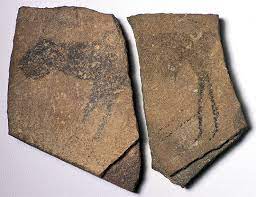
Apollo 11 Stones
Namibia, Africa; Paleolithic; Charcoal + Stone; 25,500s-25,3000 BCE; Function: ritual, observation, decoration; found on the same day Apollo 11 landed; Discovered by W.E. Wendt; Depiction of unknown animal; Art Mobilier
2
New cards
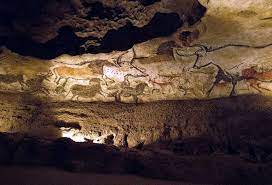
Great Hall of the Bulls
Lascaux, France; Paleolithic; Rock painting(bulls covering the ceiling and walls of a cave); Function: ritual(praying for a good hunt), observation, decoration; 15,000-13,000 BCE; Composite perspective(art is starting to get complicated);
3
New cards
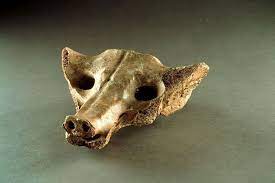
Camelid Sacrum
Central Mexico; Paleolithic; Pelvis bone(from a Camelot); 14000-7,000 BCE.; Piece was found from a dug-up well(stratigraphic testing was not conducted); When found, it was immediately taken from the area
4
New cards
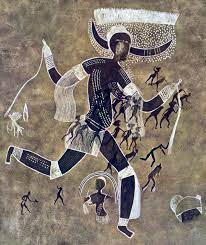
Running Horned Woman
Algeria; Neolithic; Cave painting; 6,000-4,000 BCE.; Function: Religious imagery, ritual; Found tucked into a cave \-- potentially an area with more care given to it; UNESCO world heritage site; Found with thousands of other paintings; Discovered by Lt. Brenans and Henri Lhote
5
New cards
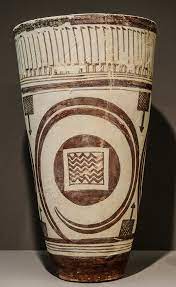
Bushel with Ibex Motifs
Susa, Iran(gravesite); Neolithic; Painted terracotta; 4,200-3,500 BCE; Funerary; Depiction of animals is usually done in respect to nature, could be used to wish the departed a good afterlife
6
New cards
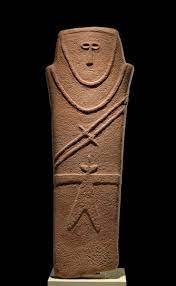
Anthropomorphic Stele
Arabian Peninsula; Neolithic; Sandstone; Fourth Millennium BCE; Function: a stele depicting a warrior; Found with material not native to Saudi Arabia(evidence of trading/a nomadic lifestyle); Funerary/Honorary; Comparisons: Apollo 11 Stones, Running Horned Woman
7
New cards
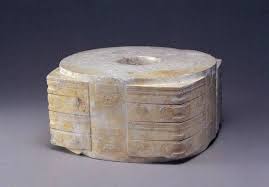
Jade Cong
Liangzhu, China; Neolithic; Carved jade; 3,300-2,000 BCE; May represent heavens/earth, and have beloved deities/emperors carved on the sides; Found with coins at a gravesite; Jade is incredibly hard to carve + lasts long(made to preserve memory?); Comparisons: Apollo 11 Stones
8
New cards
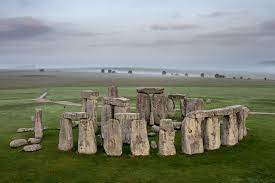
Stonehenge
Wiltshire, U.K; Neolithic; Combo of two types of sandstone(Sarsen and Blue); 2,500-1,600 BCE; Function: Religious-astronomical site(stones align with longest + shortest days of the year), ritual/ceremonial, burial(no bodies were found); Discovered by John Aubrey; Phases of Creation: 56 Aubrey holes are dug + blue stones are added, wooden posts in place of Sarsen stones(planning, Sarsen stones; Dug ditches found 2 miles away(may have been for the builders)(Left over broken pots, tools, animal bones)
9
New cards
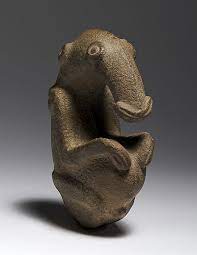
Ambum Stone
Enga Province, Papua New Guinea; Pre-Classic; Ego People; Greywacke(durable stone); 1,500 BCE; Function: honorary(stone held the soul of an animal), spiritual?; Echidnas were valued for their meat; could be a man with the head of an echidna?; Comparisons: Jade Cong
10
New cards
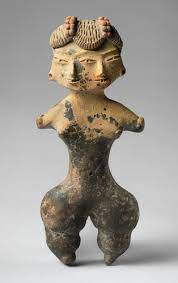
Tlatilco Figurine
site of Tlatilco, Central Mexico; Pre-Classic; Ceramic; 1,200-900 BCE; Function: observational, mythical; other pieces(animals, plants, women) were found with this(made from clay/terracotta); Comparisons: Apollo 11 Sontes, Jade Cong, Ambum Stone
11
New cards
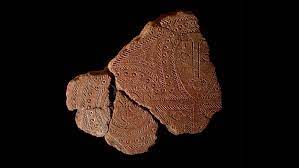
Terracotta Fragment
Solomon Islands; Pre-Classic; Lapita People; Terracotta; 1,000 BCE; Decoration; Stylized depiction of a person(could have been important to fishing/sea warrior?); Found with a number of other incised terracotta; Oldest human face found in Oceanic art; Comparisons: Apollo 11 Stones, Bushel with Ibex Motifs, Tlatico Figurine
12
New cards
Art Mobilier
A prehistoric, movable piece of art
13
New cards
Composite Perspective
A pose that combines 2 or more viewpoints in one representation
14
New cards
Funerary
Relating to a funeral
15
New cards
Stylized
Most details have been taken away, the basis for the form itself is very geometric
16
New cards
Band
The continuous line of detail that goes around an object
17
New cards
Stele
An upright slab commemorating a person or event
18
New cards
Exogenus
Material that is foreign to the land
19
New cards
Post-Lintel Construction
Two horizonal posts with one vertical post stacked on them(name specifically for construction)
20
New cards
Mortise + Tenon
When creating a trilithon, the posts have curves in them so the lintel will not fall
21
New cards
Trilithon
One grouping of two posts + one lintel
22
New cards
Megalith
One giant rock
23
New cards
Paleolithic
The early phase of the Stone Age
24
New cards
Neolithic
The latter part of the Stone Age(New Stone Age)
25
New cards
Profile
An outline of something(typically the face), as seen from one side
26
New cards
Maize
Corn
27
New cards
Echidna
Spiny anteaters
28
New cards
Bi
Ancient Chinese coins
29
New cards
Ibex
Wild Goat
30
New cards
Sacrum
Pelvic bone
31
New cards
Findspot
The place where an archaeological object has been found
32
New cards
In the round
Standing free(all sides shown)
33
New cards
Silhouette
The dark shape/outline of something against a lighter background
34
New cards
Anthropomorphic
Ascribing human characteristics to nonhuman things